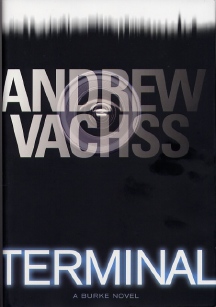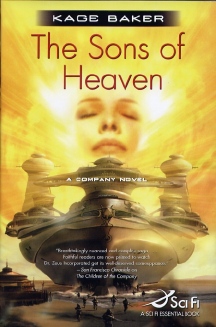|
|
|
|
This Just In...News
From The Agony Column
|
|
08-04-07: Preview for Podcast of Monday, August 6, 2007 : Watch out for
falling anvils.
Here's an MP3
preview of the Monday August 6, 2007 podcast for The Agony Column.
Enjoy!
|
| |
|
08-03-07: Andrew Vachss Brings Back Burke
|
'Terminal'
|
|
I
don't want to know what that is.
|
"Most guys
want to be outdoors every chance they get, but there's cons who know
their soaps better than any housewife."
Burying the knife in the heart of the truth. That's why we read Andrew
Vachss, that's why we subject ourselves to the terrors of his Burke novels.
Burke novels are a bizarre combination of page-turning compulsion and mind-bending
repulsion. Vachss knows how to ripsaw through a terrorizing plotline, how
to congeal the past, the present, and the unpleasant potential of the future
into a series of character-driven confrontations. He's boiled his prose
down to asphalt and broken glass. Once you immerse yourself, you can't
stop reading.
That immersion is anything but cleansing. Once he's got your attention,
Vachss manages to direct it to events you'd greatly prefer never to have
considered. He's not a wallower. In fact, Vachss really takes a few pages
from Lovecraft's horror in that he only suggests the outlines of what's
going on and let's the readers' imaginations do the work. The Burke books
are in some ways a modern exploited-child equivalent of the Cthulhu Mythos.
Two years ago, Vachss stepped out of the world of Burke with 'Two
Trains Running' a hardboiled noir set in 1959. Now in 'Terminal' (Pantheon / Ransom
House ; September 25, 2007 ; $24.95), Burke is back. An imprisoned dying
con wants to live. Why? Who knows. But in an appropriately convoluted manner,
he's willing to give up three rich men who buried a child more than thirty
years ago. This is just the sort of thing that pisses Burke off. He's in
on any scheme to nail the bastids.
'Terminal' is a short, slick, scary book that, should you flip it to
a random page, will offer you the phrase "fleabag hotel". That
should be enough for you to get the flavor here; Burke's been around for
longer than you might imagine. This time around, Vachss does seem to have
less interest in the most godawful aspect of Burke's tradecraft. You won’t
find the gardens of bagged babies that turned 'Sacrifice' into an almost
surreal horror novel. Have no doubt though, that you'll find the same
anger there, the same hands-to-throat intensity that runs through all
of Vachss'
novels.
I must confess that one of the more interesting aspects of 'Terminal' is
the excellent cover design. I can't tell exactly what that thing on the
cover is. But I can tell you it is sinister, suggestive. It's very indicative
of what you're going to find inside; black, white, a little gray, both
indistinct and crystal clear. Hard decisions quickly made. Consequences
and complications. The human drama of inhuman humans.
|
| |
| |
|
08-02-07: Owen Egerton Advises 'How Best To Avoid Dying'
|
Laugh
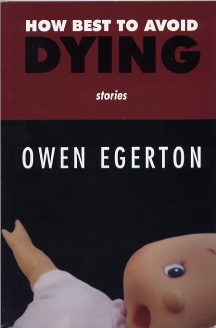 |
|
| The
B&W interior illos for this book are really creepy. |
Readers who come here to find the obscure but outstanding, rejoice!
Owen Egerton offers some sterling but strange advice
in his collection of
short stories titled 'How Best to Avoid Dying' (Dalton Publishing
; June 2007 ; $13.95), and this is advice you'll really enjoy hearing.
Egerton's
work is surreal but very accessible, and dark but very funny. This
is an outstanding collection that will have you buying his novel,
'Marshall
Hollenzer Is Driving' before you've finished reading 'How Best to
Avoid Dying'. But don’t worry. It won’t take you too long
finish. This book is a bona-fide page-turner, in the oddest possible
manner.
The pages turn so quickly due first and foremost to Egerton's delightfully
transparent writing style. These stories, no matter how weird, and
there are some very weird stories in here ("The Fecalist", for starters)
simply compel the reader with great characters and an instant immersion
that is required for work of this nature. By "work of this nature" I
mean very, very short stories; most are one to five pages, though some
longer works pop up with equally attention-grabbing power. When you’re
writing a short story like "Spelling", for example, you've got
to get the reader into your vision almost immediately and, at the same
time, place the characters in that vision within a gripping story. Egerton
does so with alarming ease, particularly because he has such a fecund imagination.
Who knew it would be so easy to imagine yourself poised over a pit, spelling
for your life and the Oil Reserves for Canada? Who might have guessed that
the last visit of a secret restaurant inspector would be so involving?
I certainly wouldn’t have, but I can say with certainty that
anything Egerton introduces is going to capture your attention and
make the rest
of the world go away.
Even though Egerton is dealing with the darkest of obsessions, death,
he consistently manages to make light of his situations without de-fanging
the unpleasant messages he's clearly sending. You will laugh when you
read "The
Fecalist", but you'll also feel the poignant angst of the depressed
artist. In "Holy Machine", Egerton uses only a single paragraph
to satirize a wide swathe of American culture, combining agony and ecstasy,
because, well, they're not all that different, are they? With every story,
Egerton delivers an impressive jolt, but beware: don’t even think
of starting a story unless you plan on finishing it. Egerton's work
is addictive.
Readers of genre fiction and literary fiction will be happy to know
that Egerton seamlessly combines the two into something very much his
own without
diluting the attributes of either. Egerton may offer a dystopian future
there or a needle-sharp character study here. Both will be written
with the sort of finesse that one finds among the best that either
genre fiction
or literary fiction has to offer. Egerton does have a fondness for
taboo subjects (cf "The Fecalist" or "Lord Baxtor Ballsington")
of which sensitive readers should be aware. Of course, such warnings
will – and
should – draw those readers who would not describe themselves
of their tastes as "sensitive". When you’re done reading
'Rant' or re-reading
'The Books of Blood', 'How Best to Avoid Dying' will assuage
your thirst for the ah – unusual.
Also contributing to the general joy of reading 'How Best to Avoid
Dying' are the production values of the book itself. It's a large 6" x9" trade
paperback with large print and a great layout. It makes Egerton's already
easy-to-read stories easier to read, no easy feat. And there are lots of
B&W photo illustrations, all consisting of different and slightly
disturbing angles on that doll we see on the cover. It's effectively
stark, classy
and creepy. If you're looking for a collection of stories that is at
once literary and surreal, science fictional and scatological, then
you'd best
not avoid 'How Best to Avoid Dying'. I might be tempted to tell you
this is the perfect bed stand book with all these great short-short
stories,
but I'd have to add the proviso that this is only true if you want
to read something to make your dreams seem tame in comparison.
|
| |
|
08-01-07: Kage Baker Welcomes 'The Sons of Heaven'
|
As Do Her Fans
|
|
The
actually important series climax.
|
Talk about a long strange trip: I suppose it's quite reasonable, after
all; ten books in ten years. Yet still.
'In the Garden
of Iden', the first book in "the Company" series
came out in 1997. The world was a different place ten years ago, and Kage
Baker's readers were surely different people. The genre itself has been
transformed more times than one can easily count. In those years too many
series to count were started, and more than a few finished. But none were
as inventive, as imaginative and as far off the usual map of science fiction
series as Baker's Company novels. Baker's long strange trip has been a
landmark in both science fiction and, I believe it will one day become
clear, general fiction. Her ability to pull off ten books in a series in
ten years, as well as a few one-offs and numerous short stories outside
the world of the Company, is nothing short of phenomenal. Finishing a series
this great in a mere ten years is important work.
Combining historical fiction, science fiction, time travel, and serious
speculation on a wide variety of subjects, Baker's novels were uniquely
individual. Nobody else has written anything close. But it was not just
the subject that distinguished her work; it was also her ability to bring
off a huge story in a richly satisfying manner. A variety of characters
grew and changed throughout the series. Not every character appeared in
every book. Whatever rules there might seem to be for creating a science
fiction series did not apply to Baker's work, yet her series seemed as
full and as comprehensible as anything else out there. We all knew it was
going somewhere. Ten years later, it has arrived.
'The Sons of Heaven' (Tor books / Tom Doherty Associates ; July 10, 2007
; $25.95) brings in all the spies from the cold, reveals the motivations
and plays out the climax of baker's long-unfolding story. And yes, for
all the great science fiction speculation, for all the inventive twists
that Baker brought to serial fiction itself, the most appealing part of
her work has been the characters. The core of great writing is universal – and
Baker is a great writer.
I'm not going to go into the details here. Nobody wants me to. We've all
just been bombarded with the climax of another series. Readers of that
series who are looking for something similarly involving, something as
moving are simply pointed at 'In
the Garden of Iden'. Readers who just finished
the ninth book in Baker's series, 'Gods and Pawns' – rejoice.
But don’t read too fast. You only get to finish this series the first
time once.
|
| |
|
07-31-07: Alan Cheuse Lights 'The Fires'
|
Think Global, Angst Local
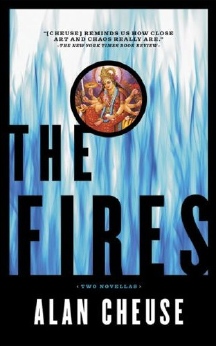 |
|
| I
forgive you in advance for just buying the book now that you
know it's out. |
You know Alan
Cheuse. He's the book reviewer for NPR's All Things Considered.
So when I tell you that Alan
Cheuse has a nice, compact little bottle
of angst and humor, two novellas collected in 'The Fires' (Santa
Fe Writer's Project ; July 31, 2007 ; $10), you have a pretty good
idea of what to
expect and why you're going to like it. Here's why.
'The Fires' includes two novellas, 'The Fires' and 'The Exorcism', that
explore themes of separation and connectedness, life, death, and life after
the death of those we love, or perhaps just once tried to love. In the
first novella, Cheuse creates the world of Gina Morgan, a menopausal woman
whose husband, Paul, is an engineer working in the chaotic creation of
capitalism colliding with communism that is Russia today. Paul's dead,
and Gina has been tasked with going beyond the beyond of Uzbekistan to
grant Paul's final wishes. This proves to be every bit as difficult as
one might imagine – and more so. Cheuse immerses us in a modern woman
on the cusp of changes external and internal, and then immerses his character
in part of our world where ancient and modern traditions are just as inextricably
jumbled by changes nobody can even conceive of controlling. It's a striking
and effective portrait of just about everything going to hell in a handbasket.
Cheuse makes the unbearable aspects of life bearable by virtue of a sort
of surreal prose that captures the jagged inner rhythms of memory and forgetfulness,
the lacunae of life that are every bit as important as those events that
sear themselves into our memory.
By contrast, 'The Exorcism' is the hilarious tale of a man confronting
the misbehavior of his college-age daughter as she confronts her grief
over the sordid death of her jazz-piano-playing mother. Once again,
it's the prose that lifts this not-so-straightforward tale into the
stratosphere
of enjoyable reading. Tom Swanson is one of the most matter-of-fact
men to experience a lot of real weird events and people you'll ever
read. Told
in the first person, 'The Exorcism' will make you laugh out loud repeatedly,
providing you don’t have a college-age child being booted for
some pretty significant missteps. Cheuse invests a tale that might
otherwise
verge into slit-your-wrists-and-hope-to-die territory with a verve
that makes Tom's and ultimately the readers' lives better.
Of course, 'The Fires' benefits from having these two similarly themed
stories side-by-side. There's an organic infiltration of idea and image
between the two works. Each informs and enlivens the other, and frankly,
'The Fires' benefits from the pairing with more carefree 'The Exorcism'.
These are two perfect little afternoon reading experiences to take you
through a weekend, Saturday and Sunday. On Monday you can probably hear
Cheuse on NPR reviewing another writer's work. One hopes for the sake of
Tom Clancy it's not one of his novels. Clancy might well be tempted to
exhibit behavior along the lines of Tom Swanson's daughter, but on a Clancy-esque
scale. Some things are best left unimagined.
|
| |
|
07-30-07: A 2007 Interview With Richard Morgan ; On-the-Scene Report from a Harry Potter Release Breakfast
|
"They drink
it and piss it up against a wall."
Warning: Richard Morgan speaks his mind. Clearly, concisely, and with
the sort of language that you can't broadcast on public radio. But it's
not just the swear words, which he uses early, often and effectively.
No, those are not what's going to upset folks. It's what he says without
swear words that will get listeners' steamed up, whether he's talking
about why we need to give women in society the money:
"If you give it to men, they drink it an piss it up against a wall,
or buy an expensive truck."
Or religion:
" ...what you find really at the heart certainly of Islam, Christianity,
Judaism, Islam, the sort of dominant patriarchal religions is a really
misogynistic, violent, domineering kind of approach to the world, and
I don't see any reason to represent it any other way. I mean, I know
that in vogue at the moment there's this idea that you mustn't upset
religious people, you must take their ideas seriously....Why? Why is
that you know?"
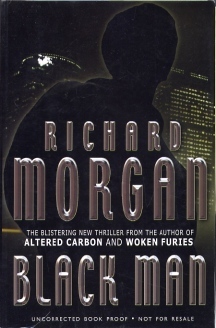
|
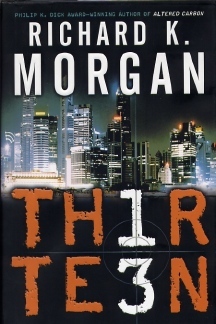 |
"You
don't buy a dog and then learn to bark yourself." |
And that's just the opening act. Richard and I spent a while talking
about the many ideas behind his book 'Black
Man' / 'Thirteen', from the
importance of the feminizing influence on society to genetic engineering
and the witches, the hobgoblins, the super-terrorists and serial killers
that have haunted mankind. He's a fascinating and funny guy. Listen to
the MP3 or RealAudio file,
be beware those around you. If you don’t
protect their ears, you may need to protect yourself.
|
Capitola Book (and Kid) Café
 |
|
| "I
am not a publicity shill for a book that needs no publicity,"
Harry said. |
I tried to make
the midnight show at Bookshop Santa Cruz, but...I just am not conscious
at that hour. Ever. So, the next morning, I was up bright and early
to attend the Harry Potter Breakfast at Capitola Book Café.
It was a and classic Santa Cruz Scene. The Great Morgani was there
in full regalia, playing the accordion. The store was giving away
some very nice breakfasts from local bakeries and there were lots
and lots of avid readers out and about. Equipped with my mobile recording
setup, I was able to capture lots of audio from the event.
What I wanted to know was how the kids who had started reading the
Harry Potter so many years ago had changed in the intervening years,
and I got some good answers. "I got bigger," one young lad
replied. I liked the sisters who had started reading Harry Potter on
a car trip as well; they literally grew up with Harry.
While I was at the celebration, I took the chance to speak with Billie
Harris, the one-time host of KUSP's Castle Cottage, who read the first
book in its entirety on the air. She and I talked about her voicings
for the characters, and how she kept them straight. And then, once
she started reading the latest, I was hushed, and then banished myself
back to my own cave to edit audio and produce both an MP3 and
a RealAudio report.
It's a bit different from my usual interview-only format, but it was
really fun. I plan on getting out and about with my mobile recorder
much more often – and posting the results here. So long as it
doesn't involve a midnight gig.
|
| |
|
|




